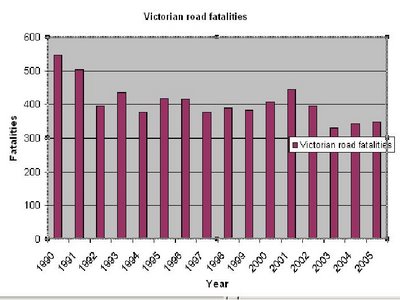Speeding kills - your wallet
To show that tough anti-speeding laws are nothing more than revenue raising traps, and don't achieve their stated aims of reducing the road toll, consider the following:
The Age:
In the 1999-2000 financial year, 574,000 speeding fines were issued. Two years later, as the measures began, it was 907,000 fines, according to Justice Department figures. To the year to June last year, it jumped to 1,307,000 infringement notices, an unprecedented number in a state with 3.5 million registered vehicles.I took the annual road toll data from here and graphed it:


Looks like the road toll has been holding steady since 2003, and even creeping upwards. The 2006 toll is forecast to be almost identical to 2005 in Victoria. NSW also has its own draconian anti-speeding laws, and unfortunately for their central planners, the 2006 road toll is 25% up on the 2005 toll. That isn't going to look good for their future plans to seize more power, as the soviet technocrats who run this state will lose face and look stupid.
Remember back in 2000, when Bracks introduced the awful 50km/hr speed limits in residential streets, under the flashy advertising "Arrive Alive" campaign ? Here is the official website, with the stated goal of:
Funny thing that.. if you look at the road toll, it actually rose in 2001 and in 2002 was close to the 2000 road toll. So Bracks the socialist planner that he is, was disappointed in not meeting his target for his 5 year plan, so he introduced even more draconian legislation, confusing school zones where the speed limit would drop to 40km/hr at certain times of the day, increased fines and increased number of cameras. But luckily enough for Bracks, cars also began to improve drastically around 2002. Safety bags became an extremely popular option, as they found their way into some of the cheaper and more popular cars. Safety crash ratings improved incredibly, and many of the older 1980's cars had found their way off the road.New 50km/h speed limits are being introduced in selected Victorian rural and outer metropolitan town centres.
The new speed limits will improve pedestrian and vehicle occupant safety and are part of the Bracks Government's arrive alive! road safety strategy to reduce the road toll by 20 per cent by 2007.
The road toll would have likely declined in those years, as it did in other states and countries anyway. Claiming the results as a victory for the 5 year road plan and the tough anti-motorist legislation is cruel and oppressive. Just as surely as governments love giving themselves power, they won't admit they were wrong and relinquish it in any hurry.
A certain organisation called Roadsense has done its own research and found that:
Our research however shows that not even 2% (two percent) of road deaths are caused by travel above set speed limits
My conclusion: Any honest statistical analysis shows that no single factor can be correlated with the number of people who die in accidents on the road. Clearly, there is a random nature to the number of accidents. They can be linked to driver training, alcohol, fatigue, road quality, safety of the car, road congestion, black spots, driver distraction and yes, to some extent, speeding.
There are also a huge range of factors that affect the severity of injuries sustained from a crash.
Sometimes people need to accelerate to overtake, or are in a rush for an emergency, or just want to keep traffic flowing well in peak hour. No person is a better judge of their own safety than the driver themself. There are already dozens of mechanisms built into the free market that encourage safe drivings. People obviously place a value on their cars, their property and their lives. Trying to tell them they will lose another $100 or $200 in a crash isn't realistically going to change their willingness/aversion to being in an accident.
Trying to impose heavy penalties and fines on speeding is immoral, and nothing more than theft.



|